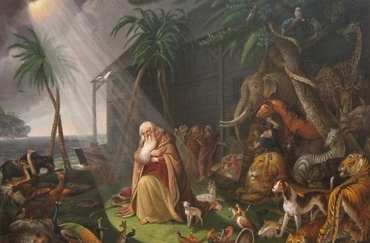Beast

In Genesis 1:24, beasts signify the things of man's will or loves. (Arcana Coelestia 44, 46)
In Genesis 9:10, beasts signify all that was living in the man of the Ancient Church, and also what belonged to his new will; likewise the lower things of his understanding and the will therefrom. (Arcana Coelestia 1026-1029)
In Psalm 104:20, beasts signify affections longing to be instructed, or spiritually nourished. (Apocalypse Explained 650[10])
In Luke 10:35, since the beast was a donkey, this signifies to instruct another according to his capability. (Apocalypse Explained 1154)
The beast of the south (Isaiah 30:6) signifies people who are principled in the knowledges of good and of truth, but do not apply them to life and instead to science.
Every beast and creeping thing (Genesis 8:19) signifies the goodnesses of the internal and external man.
"Beasts" represent the affection for doing good things, a true desire to do them from the heart. In the negative sense, "beasts" stand for the lust to do evil.
The beast ascending out of the sea (Revelation 13:1) signifies reasonings from the natural man confirming the separation of faith from life.
(References: Apocalypse Explained 13, 773; Revelation 13:11)
True Christian Religion #490
490. It is plain from the first chapter of Genesis that everything created by God was good. It says there that 'God saw that it was good' (verses 10, 12, 18, 21, 25), and at the end 'God saw everything that He made, and behold, it was very good' (verse 31). It is also plain from man's primeval state in paradise. Evil, however, arose from man, as is plain from Adam's second 1 state, that is, after the fall, by his being expelled from paradise. It is clear from these facts that if free will in spiritual matters had not been given to man, God Himself, and not man, would have been the cause of evil; in this case God would have created both good and evil, and it is wicked even to think that God created evil too. The reason why God did not create evil, since He bestowed on man free will in spiritual matters, and never puts any evil into his mind, is that He is good itself, and in good God is omnipresent, continually urging and demanding to be received. Even if He is not received, still He does not go away. For if He did, man would instantly die, or rather dissolve into non-existence, since man gets his life, and the continued existence of all he consists of, from God.
[2] Evil was not created by God but introduced by man, because man turns the good which continually flows in from God into evil, by turning away from God and turning towards himself. When this happens, the pleasure given by good remains, but it now becomes the pleasure given by evil; for without an apparently similar pleasure being left man would cease to live, since it is pleasure which makes up the vital principle of his love. These two pleasures are still diametrically opposed, though a person is unaware of this so long as he lives in the world. After death, however, he will know this and indeed feel it plainly, for then the pleasure given by the love of good is turned into heavenly blessedness, but the pleasure given by the love of evil into the torments of hell. These arguments prove that everyone is predestined to heaven, and no one to hell; but it is the person who commits himself to hell by misusing his free will in spiritual matters. As a result he embraces the ideas wafted from hell, since, as was said above, everyone is held mid-way between heaven and hell, so that he can be in equilibrium between good and evil, and consequently have free will in spiritual matters.
Footnotes:
1. Reading secundo for secundum.






